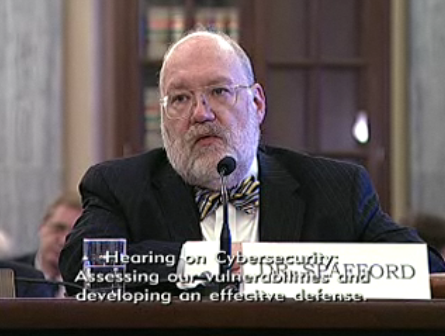Posts tagged internet
Page Content
This time, the Senate
On March 19, I had an opportunity to testify before the Senate Committee on on Commerce, Science, and Transportation. The hearing was entitled Cybersecurity -- Assessing Our Vulnerabilities and Developing An Effective Defense.
I was asked to include information on research problems, educational initiatives, and issues regarding the current state of cyber security in the nation. As is usual for such things, the time between the invitation and the due date for written testimony was short. Thus, I didn't have the time to delve deeply into the topic areas, but could only address the things that I already had on hand -- including some posts from this blog that I had written before. The result was a little longer than the other statements, but I think I covered more ground.
One hint for people testifying before Congress on such things: you can't depend on how long you will have for spoken remarks, so be sure any points you want to make are in your written testimony. In this case, the hearing was limited to about 75 minutes because there were several votes scheduled on the Senate floor, and the committee needed to adjourn to allow the Senators to attend the votes. And, as is common for too many hearings, there weren't many of the committee members present; I believe the hearing began with only two of the 25 members present, and some movement of members in and out to reach a maximum of four seated at any one time. In this case, the chair (Senator Jay Rockefeller of West Virginia) apologized to us several times for the low turnout. However, many (all?) of the staff and aides were present, so I'm certain the gist of the testimony presented will be considered.
The Senator made a nice introductory statement.
My written testimony is available on my website as well as the committee site. My oral statement was from rough notes that I modified on the fly as I listened to the other testimony (by Jim Lewis, Eric Weiss and Ed Amoroso). That statement, and the whole hearing, are available via the archived hearing webcast (my remarks start at about 46:30 into the webcast). If I get a transcribed version of those remarks, I will post them along with my written testimony on my website in the "US government" section.
Comments by the other speakers were good overall and I think we collectively covered a lot of ground. The questions from the Senators present indicated that they were listening and knew some of the problems in the area. The comments from Senator Nelson about the intrusions into his systems were surprising: several Senate security staff were present at the hearing and indicated to me that his remarks were the first they had heard of the incidents! So, the hearing apparently set off an incident-response exercise -- separate from responding to my presence in the building, that is. ![]()
Will this hearing make a difference? I don't know. I've been testifying and saying the same things for over a dozen years (this was my 8th Congressional hearing testimony) and things haven't gotten that much better...and may even be worse. Senator Rockefeller has indicated he intends to introduce legislation supporting more funding for students studying cyber security issues. There was some good news coverage of all this (e.g., FCW and CNet).
I am told that there will be more hearings by this committee. Some House committees have been holding hearings too, and the President's 60 day review continues apace. The added attention is great, but with the sudden interest by so many, the result may be more confusion rather than resolution.
Stay tuned.
As a reminder, if you want to know about my occasional postings such as this but don't want to subscribe to the RSS feed, you can subscribe to the mailing list.
Also as a reminder, there is my tumble blog on security issues, with links to items on the news and WWW of possible interest to those who find my ramblings and rants of interest.
Do we need a new Internet?
Short answer: " Almost certainly, no."
Longer answer:
The blogosphere is abuzz with comments on John Markoff's Saturday NT Times piece, Do We Need a New Internet? John got some comments from me about the topic a few weeks back. Unfortunately, I don't think a new Internet will solve the problems we are facing.
David Akin, a journalist/blogger commented on nicely John's post. In it, he quoted one of my posts to Dave Farber's IP list, which I then turned into a longer post in this blog. Basically, I noted that the Internet itself is not the biggest problem. Rather, it is the endpoints, the policies, the economics, and the legal environment that make things so difficult. It is akin to trying to blame the postal service because people manage to break into our houses by slipping their arms through the mailslots or because we leave the door unlocked "just in case" a package is going to be delivered.
Consider that some estimates of losses as a result of computer crime and fraud are in the many billions of $$ per year. (Note my recent post on a part of this.) Consider how much money is repeatedly spent on reissuing credit and debit cards because of loss of card info, restoring systems from backups, trying to remove spyware, bots, viruses, and the like. Consider how much is spent on defensive mechanisms than only work in limited cases -- anti-virus, IDS, firewalls, DLP, and whatever the latest fad might be.
What effect does that play on global finances? It is certainly a major drag on the economy. This was one of the conclusions (albeit, described as "friction") of the CSTB report Towards a Safer and More Secure Cyberspace, which did not seem to get much attention upon release.
Now, think about the solutions being put forward, such as putting all your corporate assets and sensitive records "out in the cloud" somewhere, on servers that are likely less well-protected or isolated than the ones being regularly compromised at the banks and card processors. But it will look cheaper because organizations won't need to maintain resources in-house. And it is already being hyped by companies, and seemingly being promoted by the NSF and CCC as "the future." Who can resist the future?
Next, stir in the economic conditions where any talk is going to be dismissed immediately as "crazy" if it involves replacing infrastructure with something that (initially) costs more, or that needs more than a minor change of business processes. And let's not forget that when the economy goes bad, more criminal behavior is likely as people seek value wherever they can find it.
The institutional responses from government and big vendors will be more of the same: update the patches, and apply another layer of gauze.
I have long argued that we should carefully re-examine some of the assumptions underlying what we do rather than blindly continue doing the same things. People are failing to understand that many important things have changed since we first started building computing artifacts! That means we might have better solutions if we really thought about the underlying problems from first principles.
I recently suggested this rethinking of basic assumptions to a few senior leaders in computing research (who shall remain nameless, at least within this posting) and was derided for not thinking about "new frontiers" for research. There is a belief among some in the research community (especially at the top universities) that the only way we (as a community; or perhaps more pointedly, them and their students) will get more funding for research and that we (again, the royal "we") will get premier publications is by pushing "new" ideas. This is partly a fault of the government agencies and companies, which aren't willing to support revisiting basic ideas and concepts because they want fixes to their existing systems now!
One part that makes sense from Markoff's article is about the research team making something that is effectively "plug compatible" with existing systems. That is roughly where a longer-term solution lies. If we can go back and devise more secure systems and protocols, we don't need to deploy them everywhere at once: we gradually phase them in, exactly as we do periodic refreshes of current systems. There is not necessarily an impassible divide between what we need and what we can afford.
I'm sorry to say that I don't see necessary changes occurring any time soon. It would upset too much of the status quo for too many parties. Thus, the situation isn't going to get better -- it's going to get worse -- probably much worse. When we finally get around to addressing the problems, it will be more expensive and traumatic than it needed to be.
As I noted before:
"Insanity: doing the same thing over and over again expecting different results."
Of course, my continued efforts to make this point could be branded insane. ![]()
An Aside
Over a decade ago, I gave several talks where I included the idea of having multiple "service network" layers on top of the Internet -- effectively VPNs. One such network would be governed by rules similar to those of the current Internet. A second would use cryptographic means to ensure that every packet was identified. This would be used for commercial transactions. Other such virtual networks would have different ground rules on authentication, anonymity, protocols and content. There would be contractual obligations to be followed to participate, and authorities could revoke keys and access for cause. Gateways would regulate which "networks" organizations could use. The end result would be a set of virtual networks on the Internet at large, similar to channels on a cable service. Some would be free-for-all and allow anonymous posting, but others would be much more regulated, because that is what is needed for some financial and government transactions.
I remember one audience at an early SANS conference at the time was so hostile to the idea that members began shouting objections before I could even finish my talk. I also couldn't find a venue willing to publish a speculative essay on the topic (although I admit I only tried 2-3 places before giving up). The general response was that it would somehow cut out the possibility for anonymous and experimental behavior because no one would want to use the unauthenticated channels. It was reminiscent of the controversy when I was the lead in the Usenet "Great Renamng."
The problem, of course, is that if we try to support conflicting goals such as absolute anonymity and strong authentication on the same network we will fail at one or the other (or both). We can easily find situations where one or the other property (as simply two examples of properties at stake) is needed. So long as we continue to try to apply patches onto such a situation before reconsidering the basic assumptions, we will continue to have unhappy failures.
But as a bottom line, I simply want to note that there is more than one way to "redesign the Internet" but the biggest problems continue to be the users and their expectations, not the Internet itself.

